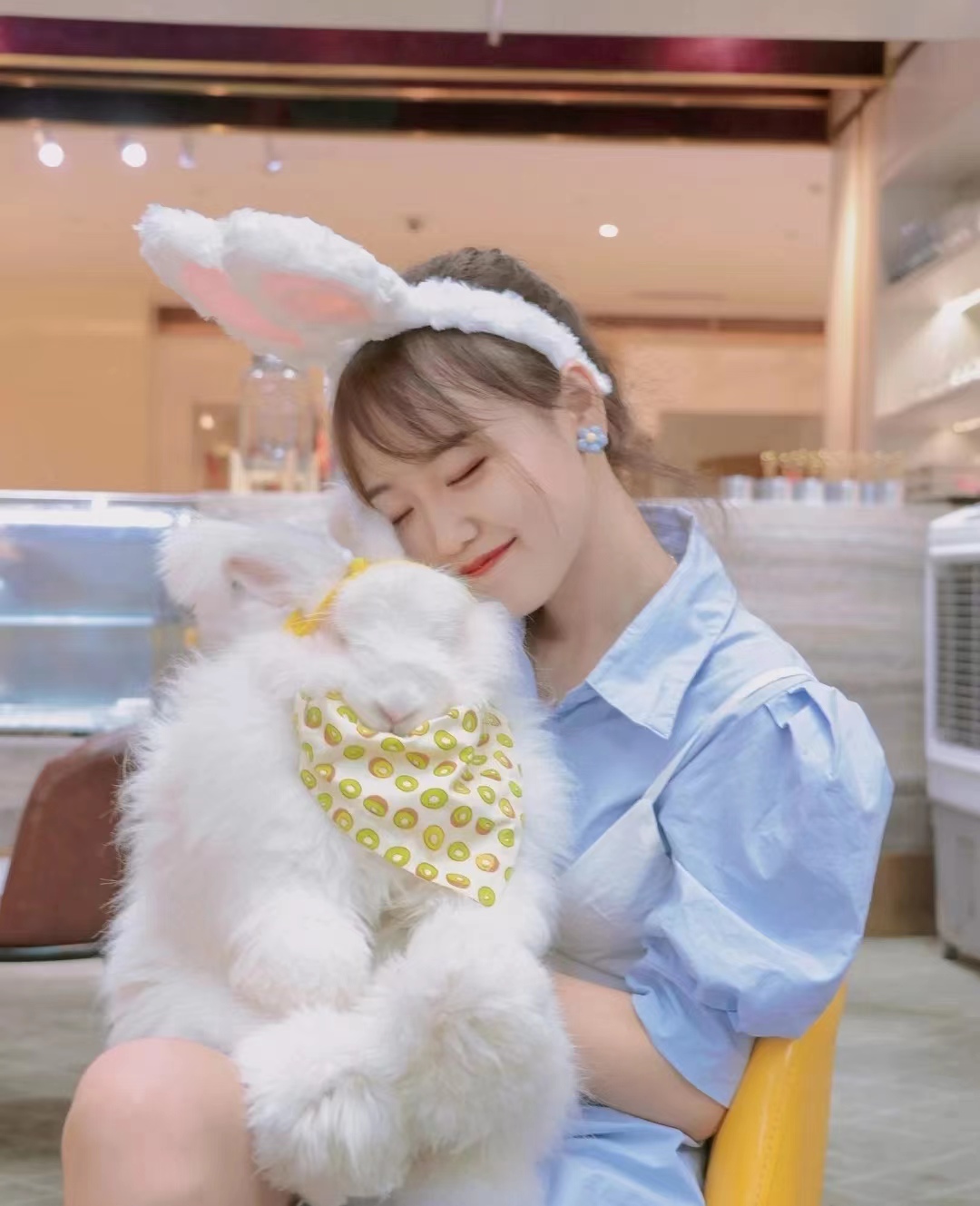


蒙陰長毛兔:王室寵物——安哥拉兔
 發布日期:2025-10-23
來源:http://www.m6i42s8.cn 發布人:創始人
發布日期:2025-10-23
來源:http://www.m6i42s8.cn 發布人:創始人
安哥拉兔(Angora rabbit),俗稱長毛兔,是世界毛用型家兔品種。其毛發是一種紡織原料,具有絕熱性高、重量輕的特征,可用于粗紡和精紡,被譽為世上細的“華貴”纖維。安哥拉兔產毛效率高,年產毛量可達1190~2000克,且飼料消耗少,具有較高的經濟價值。安哥拉兔曾被認為起源于土耳其的安哥拉省,因此被命名為安哥拉兔。后經調查考證,起源地實為英國。安哥拉兔傳入不同后,經過長期選擇與培育形成了不同的種群,包括英系、法系、德系、日系和中系等品系。形態特征安哥拉兔全身絨毛厚實且濃密,被毛有毛叢結構,不易纏結,有波浪式彎曲。面部有些無長毛,也有些額毛、頰毛豐盛,但大部分耳背無長毛,僅有耳尖的一撮長毛。四肢、腹部都有茂密的絨毛,體毛細長且柔軟,排列整齊。四肢強健,背部平直,頭型略尖,耳朵呈V狀,眼睛大而圓。安哥拉兔體型較大,成年體重可達3.5~5.7kg。體長約45cm,胸圍30~35cm。
Angora rabbit, commonly known as long haired rabbit, is a world-renowned breed of domestic rabbit used for fur. Its hair is a high-grade textile material with high insulation and lightweight characteristics, which can be used for coarse and fine spinning, and is known as the finest "luxurious" fiber in the world. Angora rabbits have high wool production efficiency, with an annual wool production of 1190-2000 grams and low feed consumption, making them of high economic value. Angora rabbit was once thought to originate from Türkiye's Angora Province, so it was named Angora rabbit. After investigation and verification, it was found that the origin was actually in England. After being introduced to different countries, Angora rabbits have undergone long-term selection and cultivation to form different populations, including English, French, German, Japanese, and Chinese strains. Morphological features: The Angora rabbit has thick and dense fur throughout its body, with a tuft structure that is not easily tangled and has wavy curves. Some parts of the face have no long hair, while others have abundant hair on the forehead and cheeks. However, most of the earlobes have no long hair, only a tuft of long hair at the tips of the ears. The limbs and abdomen have dense fur, and the body hair is slender and soft, arranged neatly. Strong limbs, straight back, slightly pointed head, V-shaped ears, large and round eyes. Angora rabbits have a large body size, with an adult weight of up to 3.5-5.7kg. They are approximately 45cm in length and have a chest circumference of 30-35cm.
生活環境安哥拉兔受到超過臨界溫度的影響顯著。仔兔的適環境溫度為30℃~32℃,幼兔的適溫度為20℃~25℃,成年兔的適溫度范圍較大,為15℃~25℃,臨界溫度為5℃和30℃。高溫環境會嚴重影響安哥拉兔幼崽的生長、進食以及受胎能力,而且隨著溫度的增長,微生物變得更加活躍,導致安哥拉兔的得病率上升、抵抗力下降;低溫環境則不利于安哥拉兔的心肺功能正常運轉。生活習性安哥拉兔屬于晝伏夜出性動物,白天多靜伏籠中,屬于半睡眠狀態,采食量少;夜間十分活躍,頻繁采食和飲水,進食占全天的70%左右,飲水占全天的60%左右。安哥拉兔神經敏感,膽小怕驚,如遇突然的刺激、異常的聲音,就會精神不安,食欲減退,甚患病死亡。安哥拉兔是食草動物,喜歡吃青綠鮮嫩多汁的飼料,其次是粗磨的顆粒飼料,不喜歡吃粉料。結語:
The living environment of Angora rabbits is significantly affected by temperatures exceeding the critical threshold. The optimal environmental temperature for young rabbits is 30 ℃~32 ℃, the optimal temperature for young rabbits is 20 ℃~25 ℃, and the optimal temperature range for adult rabbits is relatively large, ranging from 15 ℃~25 ℃. The critical temperatures are 5 ℃ and 30 ℃. The high temperature environment can seriously affect the growth, feeding, and conception ability of Angora rabbit cubs, and as the temperature increases, microorganisms become more active, leading to an increase in disease incidence and a decrease in resistance in Angora rabbits; Low temperature environment is not conducive to the normal functioning of the heart and lungs of Angora rabbits. The Angora rabbit belongs to the category of diurnal nocturnal animals, and is often kept in a quiet cage during the day. It belongs to a semi sleeping state and has a low food intake; Very active at night, frequently eating and drinking, with eating accounting for about 70% of the day and drinking accounting for about 60% of the day. Angora rabbits have sensitive nerves and are timid and afraid of being startled. If they encounter sudden stimuli or abnormal sounds, they will feel anxious, lose appetite, and even die from illness. Angora rabbits are herbivores who prefer green, tender, and juicy feed, followed by coarse ground pellet feed, and do not like to eat powdered feed. Conclusion:
在這一期的生物小課堂中,我們為大家帶來了可愛的安哥拉兔。通過我們的詳細介紹,相信大家對這種可愛的生物已經有了初步的了解和認識。接下來,我們期待與您一起踏上這段奇妙的生命探索之旅,共同感受大自然的生機與活力,領略那色彩斑斕的自然之美。而在未來的文支行中,我們將繼續為您揭示自然界中更多神秘而有趣的生物,讓您深刻感受到生命的無限魅力和這個世界的精彩紛呈。讓我們一同期待,共同探索生命的奧秘與魅力吧!
In this biology class, we brought you a cute Angora rabbit. Through our detailed introduction, we believe that everyone has gained a preliminary understanding and recognition of this adorable creature. Next, we look forward to embarking on this wonderful journey of life exploration with you, experiencing the vitality and energy of nature together, and appreciating the colorful beauty of nature. In future cultural branches, we will continue to reveal more mysterious and interesting creatures in nature, allowing you to deeply experience the infinite charm of life and the wonderful diversity of this world. Let's look forward together and explore the mysteries and charm of life together!
本文由 蒙陰長毛兔 友情奉獻.更多有關的知識請點擊 http://www.m6i42s8.cn/ 真誠的態度.為您提供為的服務.更多有關的知識我們將會陸續向大家奉獻.敬請期待.
This article is contributed by the friendship of Mengyin Long haired Rabbit For more related knowledge, please click http://www.m6i42s8.cn/ Sincere attitude To provide you with comprehensive services We will gradually contribute more relevant knowledge to everyone Coming soon.